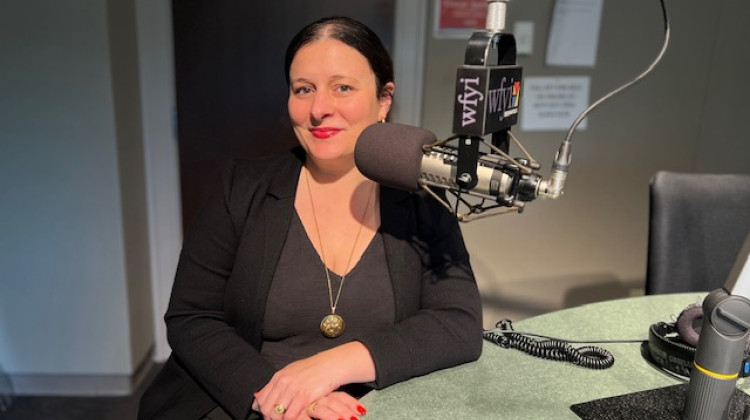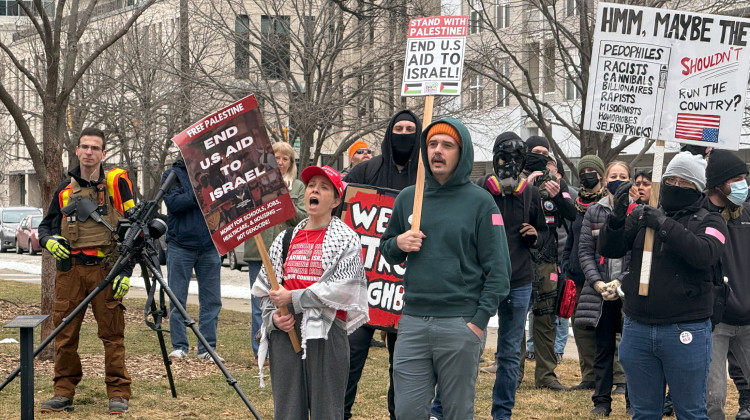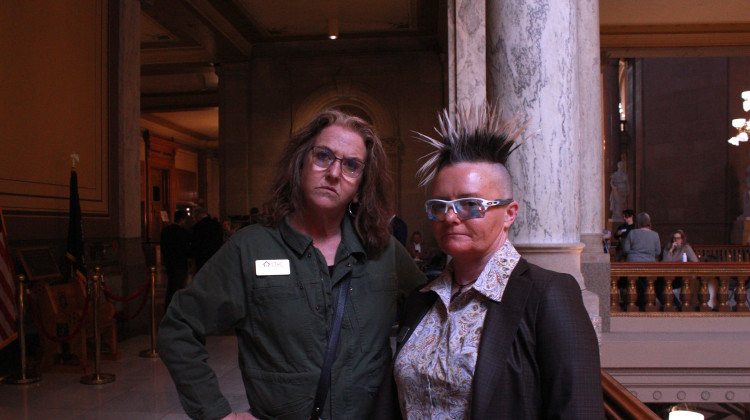It was last summer when sexual harassment allegations within Indianapolis Mayor Joe Hogsett's administration surfaced. Since then, more people have come forward with stories of misconduct. An independent review found the Hogsett administration legally compliant, but that review has since been challenged.
Local Democratic political strategist Elise Shrock stood by and counseled people who came forward throughout these events, including Lauren Roberts, who was the first woman to accuse former Hogsett chief of staff Thomas Cook of sexual harassment. Shrock and Roberts were both forcibly removed from a recent city meeting.
WFYI’s Jill Sheridan sat down with Shrock to learn why she chose to be so visible.
This interview has been editted for style, length and clarity.
Jill Sheridan: Why is it so important to be an ally for these women to stand up to demand accountability?
Elise Shrock: Well, I think one of the unfortunate things that we're seeing is that a year has gone by, and not much has happened. I think the trauma that has happened and, for lack of a better term, body count of trauma, has only grown in number for folks who are experiencing this, who are coming forward, who have been added on to — myself included — after what happened at the June 9 council meeting. What I think survivors hope when they come forward, what they hope to see, is accountability so that they can help build a better system. And that's just simply not happened.
Sheridan: You mentioned that June 9 meeting, we were there when we witnessed you and Lauren being pushed out. In the aftermath of this, you wrote that you were really upset. People stayed silent — people that you've been working with for so long, mentors, friends, colleagues. Have you heard from people now? How are you feeling?
Shrock: I'm grieving, like I said in my column. I'm grieving a lot of relationships. I'm grieving a lot of expectations. That was such a dehumanizing experience for me, for the other survivors. It was a chilling experience for other folks who I wasn't aware of at the time, who had come to speak about their own personal stories of abuse in the Hogsett administration, who decided to stay silent that night. Even though they brought their families, they stayed silent after they saw what happened to us.
This is messy work. Calling for accountability is such messy work. And I'm always wondering why, when I helped quite a few of these folks as they ran for office, it was with the hope that they would rise to the expectation to be the leader that our city deserves, and they're not doing that right now. When we call for accountability, when we say, "Hey, there's a problem. There's a fire. We need helpers," we're looking for help.
Leaders help. They put out those fires, and they change systems to make sure that the house doesn't catch on fire again. They don't settle for scraps. They don't grasp on to their own power and watch things burn for their own political gain. And it's very disappointing.
Sheridan: We talked with a representative from the National Women's Defense League who said the issues here locally were brought up to her through you. You pointed to the City-County Building, and you were like, "You have to take a look over here as well." Why was that important to do?
Shrock: I have been trying to help Lauren find accountability since 2017. I've been working, trying to do it, whatever I think the establishment feels is “the right way," trying to work internal channels. I tried to do that. I think on the Senate side, I have been someone who women, other workers, have come to for a long time when something happens. And then they need help, but many people who will never, ever share their story publicly, which I respect, because that clearly comes at a huge cost.
I think it's sad that someone like me has to exist. I think it's really sad that there aren't reporting avenues that are independent of the power structures that these folks work in. They feel like they have to come to someone like me to try and troubleshoot the least worst path forward.
I've been doing that with folks, whether it's people who were abused by Curtis Hill, the former attorney general; people who were abused by Sen. Greg Taylor, who’s still in office; people who are abused by folks in the Hogsett administration and the folks in his cabinet who are still holding power over them. And the National Women's Defense League reached out to me because Indiana has made headlines for all of this, for all of the wrong reasons, and we're losing our workforce.
None of the people who have come to me who I've helped essentially chaplain through these difficult times in their lives — they are leaving. These are talented people who the Democratic Party, or any party, desperately needs to contribute to the work, who our neighbors deserve to have in the fight, in the work, fighting for them. And they're gone. It's a workforce issue.
Sheridan: We are seeing this, as you mentioned on a national level. But here in Indiana, it may be more acute, is what you're saying?
Shrock: Well, the National Women's Defense League has done some really great research. Earlier this year, they released their Abuse of Power report where they study this type of abuse of power, mostly in state legislatures throughout all 50 states. I think what's really telling is that Indiana got its own pull out page in that report, and that's really damning. It's really disappointing.
I think that's why I feel so frustrated when there's data that shows that there is an issue, and then victims, survivors are trying to reach out to state legislators to find some type of accountability. They're told however they reach out to them is not “the right way.” Then they try to find another avenue — in the June 9 case, public comment, where the public is encouraged to come comment. And even that is met with undue force, which creates an environment where whistleblowers and survivors are treated like troublemakers, when the people who are creating the trouble are the abusers.
And that sends a message, and that is a very problematic message when we have the data that shows how we're doing everything wrong, but people still want to protect their power. Empire protects empire.
Sheridan: So in that vein there, the local, the state response, and the response with how people are allowed to still exist within the party.
Shrock: Yeah, and it's not just figureheads. It is the people who continue to fund these folks’ campaigns. This is not just one figurehead, even though I think in the case of Joe Hogsett, he stands at the very peak of this mountain, of this culture. But there are a lot of people holding that up.
These are, you know, members of the Democratic Party, the Democratic establishment, that refuse to enact any type of accountability where they could. And other states have done that, whether it's taking away access to certain Democratic party tools, barring folks from fundraising opportunities. Those channels are out there. There is precedent for that, whether it is developers, corporate donors that he takes a lot of money from, who we have seen continue to fund him because it benefits them.
And they are willing to contribute to him knowing, you know, for a full year, we have seen all of these stories come out, and they don't care. They don't care about the culture of abuse and sexual assault, and they are going to continue to fund this because it benefits them. There are a lot of people in the cabinet who are also, you know, meeting folks with aggression. So, it's a cultural system that needs to be met with accountability.
Sheridan: A lot of people have proposed a lot of changes, said a lot of things about what they would like to see happen within the administration, better training, whistleblower protections. What do you think is really going to make a difference?
Shrock: I think it's a two-fold thing. There are several policy changes that need to be made. A lot of audits of what's actually happening in the city-county building right now, in their HR structures. There are several policy changes that I know of. That and there are survivors who are working with folks on the council in earnest to try to change, which is, again, emotional and free labor that these folks are giving on top of the trauma they have experienced unfairly.
So, it's a two-fold thing, where we need policy change, but we also need leadership change at the top. If folks have shown us that they don't have the moral clarity to lead, they need to get out of the way so that we can have a fresh new era that is befitting of the type of government that Indianapolis deserves. Because we have so many needs. We have housing needs, we have medical care needs, we have needs for education that are not being met in the way that I think a lot of our neighbors are expecting. And this becomes a huge distraction, and it will continue to be a distraction until it is fixed. It cannot be managed as a PR crisis. It has to be fixed before we can move forward.
Sheridan: What's at stake right now, Elise?
Shrock: Well, the public trust has been broken. People are looking at Indianapolis. We're making headlines in all the wrong ways. And you know, one thing I give Indianapolis credit for is, Indianapolis stays cool despite the leadership at the top. Indianapolis is a vibrant place full of doers who roll their sleeves up, who bring all of their cultural experiences to the forefront, who create, who are entrepreneurs, who are artistic, who keep the progress of our city moving forward, no matter who's at the top.
But imagine what we could do if we weren't distracted by all of this bs, and we knew that all of those people can contribute to a city government that actually kept them safe, and all of the workers in the city government could go to work, do their job, partner with all these other doers, and know that they could do their work safely.
A previous comment from Indianapolis Mayor Joe Hogsett stated he has no intention of resigning but acknowledged there was more work to do to ensure the confidentiality and safety of every employee. Shrock has also been a source on WFYI’s program Indiana Week in Review.
 DONATE
DONATE








 Support WFYI. We can't do it without you.
Support WFYI. We can't do it without you.